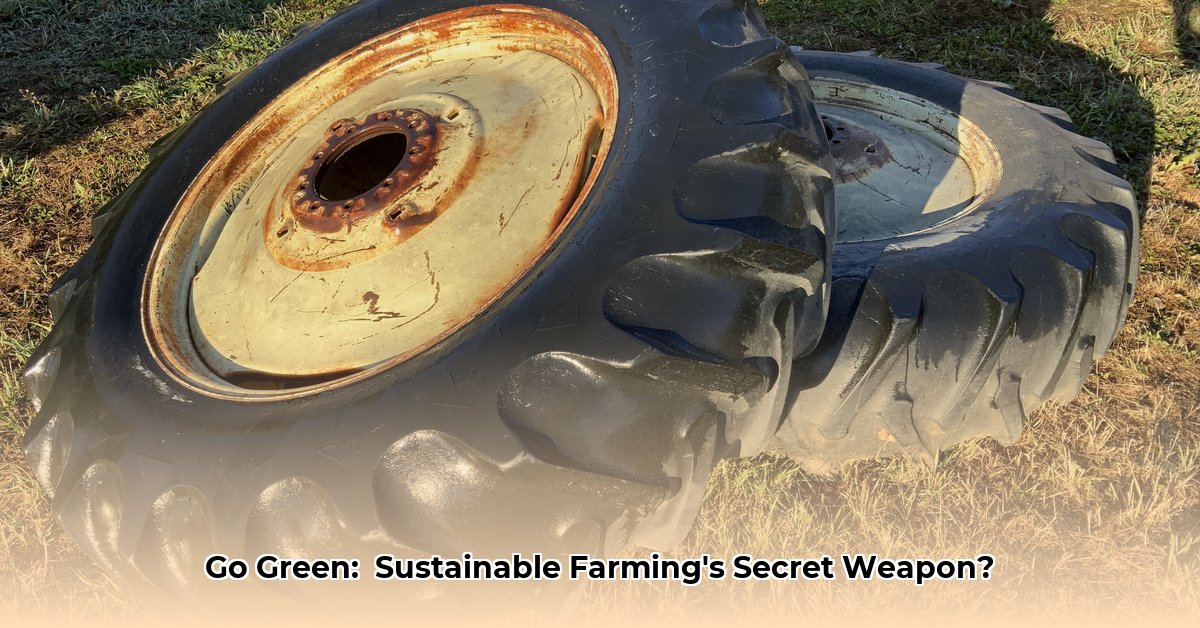
Choosing the right tractor tires significantly impacts your farm's profitability and environmental footprint. This guide focuses on selecting 18.4-38 tractor tires for sustainable farming, emphasizing fuel efficiency, tire longevity, soil health, and eco-friendly manufacturing. For more information on 18.4-38 tires, check out this helpful resource: 18.4-38 Tire Guide.
18.4-38 Tractor Tires: Making Sustainable Choices
Your tractor tires have a more significant impact than just traction; they directly affect soil health, fuel consumption, and your farm's overall sustainability. Making informed decisions about your 18.4-38 tires is crucial for long-term success.
Why Tire Selection is Critical: Beyond Rubber
Tractor tires constantly interact with your land. Improper inflation leads to increased fuel consumption, premature wear, and soil compaction—all detrimental to profitability and field health. Conversely, the right tires can save you money, increase yields, and protect the environment. But how do you choose?
Selecting Sustainable 18.4-38 Tractor Tires: Key Factors
Several key elements guide sustainable 18.4-38 tractor tire selection:
Longevity: Longer-lasting tires mean fewer replacements, reducing waste and costs. Prioritize durable, high-quality tires designed for your specific operating conditions.
Fuel Efficiency: Lower rolling resistance tires translate to fuel savings and reduced emissions—a win-win for your budget and the environment.
Soil Health: Soil compaction reduces root growth, leading to lower yields. Properly inflated tires minimize soil compaction, fostering healthy, productive fields.
Eco-Friendly Manufacturing: Consider the entire tire lifecycle—from production to disposal. Look for tires made with recycled materials and manufacturers with responsible disposal programs.
A Step-by-Step Guide to Sustainable Tire Selection
Choosing sustainable 18.4-38 tractor tires involves a systematic approach:
Assess Your Needs: Analyze your soil type, typical loads, and working conditions to determine the appropriate load capacity and tread pattern.
Conduct Thorough Research: Compare different brands and models; read reviews and seek recommendations from other farmers. Focus on longevity, fuel efficiency, and soil compaction impact, using factors like rolling resistance and load index as key performance indicators.
Look for Eco-Labels: Certifications or eco-labels indicate tires made with recycled materials or using environmentally responsible practices.
Master Tire Inflation: Proper inflation is crucial for maximizing tire life and minimizing soil damage. Regularly check and adjust tire pressure according to manufacturer recommendations and operating conditions. According to Heuver (n.d.), proper inflation can improve traction and minimize soil damage.
Plan for Responsible Disposal: Before purchasing, investigate the manufacturer's or supplier's tire recycling program. Sustainable disposal prevents tires from ending up in landfills.
Comparing Tire Options: A Balanced Approach
Different tire types offer varying benefits and trade-offs:
| Tire Feature | Sustainable Option (e.g., Low Rolling Resistance) | Conventional Option |
|---|---|---|
| Upfront Cost | Typically Higher | Typically Lower |
| Fuel Savings | Substantial | Lower |
| Tire Lifespan | Potentially much longer | Shorter |
| Soil Compaction | Significantly Reduced | Higher |
| Environmental Impact | Lower overall (considering the entire lifecycle) | Higher overall |
While the initial cost of sustainable tires might be higher, long-term savings on fuel and replacements often outweigh this difference. Furthermore, the environmental benefits are invaluable. Isn't it worth investing in reduced soil compaction?
Minimizing Soil Compaction with Sustainable Tire Choices
Key Takeaways:
- Soil compaction severely impacts crop yields and long-term farm sustainability.
- Specialized tires like IF, VF, and CFO/CHO offer superior load-bearing capacity at lower pressures, minimizing compaction compared to standard R1 tires.
- Precise tire pressure management is critical for optimizing traction and reducing soil damage.
- Investing in sustainable tire options enhances long-term soil health and farm profitability.
- Consider the comprehensive lifecycle of your tires – from creation to disposal – for a complete sustainability approach.
Understanding the Negative Impacts of Soil Compaction
Healthy soil is the foundation of thriving agriculture. Soil compaction, often caused by heavy machinery, severely hinders root growth, water infiltration, and nutrient uptake. This decrease in productivity leads to reliance on fertilizers and irrigation, negating sustainable farming principles.
The Importance of Tire Selection in Soil Compaction
The pressure exerted by tractor tires directly affects soil compaction. Standard R1 tires prioritize traction but often lead to significant soil compression. This is where specialized tires offer a solution. Tires designed for low ground pressure, such as IF, VF, and CFO/CHO, enable heavy load carrying at significantly lower pressures – reducing soil compaction.
A Practical Guide to Selecting Sustainable Tires
Assess Your Specific Needs: Analyze your soil type, typical field conditions, crops, and tractor size and weight.
Research Various Tire Options: Explore IF, VF, and CFO/CHO tires, comparing load-carrying capacity, inflation pressure, and tread patterns. Farmer reviews offer valuable insights.
Seek Expert Advice: Consult with agricultural equipment dealers and other farmers in your area for tailored guidance.
Consider Central Tire Inflation Systems (CTIS): CTIS allows for precise pressure adjustments, optimizing traction and minimizing compaction across different terrains.
Evaluate Long-Term Cost-Effectiveness: Though high-flexion tires higher initial costs, reduced fuel, increased yields, and lessened fertilizer/irrigation needs often result in long-term savings.
Comparing Tire Types: Weighing the Pros and Cons
| Tire Type | Pros | Cons |
|---|---|---|
| R1 | Widely available, relatively inexpensive | High soil compaction, lower efficiency |
| IF | Improved load capacity at lower inflation pressure | More expensive than R1 tires |
| VF | Very high load capacity at significantly lower pressure | Higher initial investment; requires careful maintenance |
| CFO/CHO | Extremely low ground pressure, best for sensitive soil conditions | Limited availability; substantial upfront investment cost. |
Beyond tire selection, optimizing farming practices such as maintaining proper inflation, planning field operations, utilizing precision agriculture, and considering alternative tillage methods can further minimize soil compaction. A comprehensive approach is key for achieving true sustainability and enhanced farm profitability.
[1 Heuver. (n.d.). Reduce your soil compaction. Retrieved February 23, 2025, from https://www.heuver.com/knowledge/agricultural/reduce-your-soil-compaction]